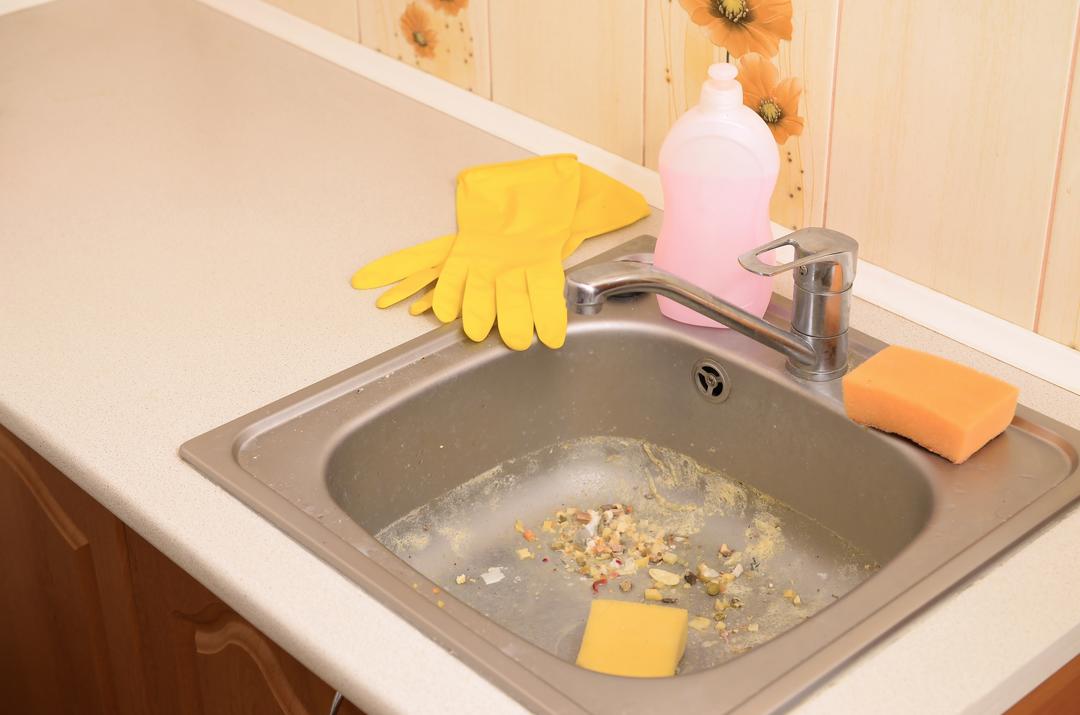Garbage Disposal Do’s and Don’ts

To help your garbage disposal last longer and run as efficiently as possible, we’ll go over 3 garbage disposal do’s:
And 3 garbage disposal don’ts:
Need a garbage disposal repair or replacement? Call Michael & Son.
Our plumbers will inspect your existing garbage disposal and, if possible, repair it so it’s working properly again. If you’re looking for a new disposal, we’ll recommend the best, most powerful garbage disposal options for your kitchen.
Here are the things you should do
Run the disposal with cold water
Running water helps flush food through the disposal and down the drain. Using the disposal without water can cause food to get stuck inside, jamming it.
You may have heard that hot water is better than cold, but we don’t recommend it.
While hot water does help soften some foods, it also causes them to cling to the blades and sides of the garbage disposal and the drain. Once the food cools and hardens again, it’s stuck there. Over time, this buildup can cause a clog in the drain or slow down the garbage disposal.
This is why it’s essential to keep your garbage disposal clean.
Keep it clean
To keep your garbage disposal clean, make sure you’re running it properly:
- Turn on the faucet before turning on the disposal.
- Keep the faucet on while grinding foods.
- Let the faucet run for another 5–10 seconds after the disposal is off.
If you notice foul odors coming from your disposal, you can freshen it with a few DIY methods:
- Baking soda and vinegar: Pour half a cup of baking soda into the disposal, followed by a cup of vinegar, and let the mixture sit for 10 minutes. Turn on the hot water while running the disposal to clean out the baking soda.
- Citrus: Slice a handful of lemon, lime, orange, or other citrus peels and feed them down the disposal while running cold water.
- Ice and salt: Pour two cups of small ice cubes down the disposal, followed by one cup of coarse kosher or rock salt. Turn on cold water and let the disposal run for a few seconds. Breaking the ice cleans the blades of any food or guns stuck to the blades, and the salt helps with deodorizing. To help deodorize more, you can also add a bit of dish soap or a citrus peel when grinding the ice.
Don’t clean your disposal using harsh chemicals, as they can eat away at components and pipes, resulting in a burst pipe or cause the disposal to die faster than it should.
If your garbage looks like it needs a more thorough cleaning, you can unplug the disposal and take a small, soft-bristled brush to it to remove some of the gunk.
Call a plumber if you’re not comfortable doing the job yourself for any cleanings that require you to take the disposal apart.
Use the disposal regularly
Regularly running the garbage disposal helps prevent it from:
- Rusting: Disposal blades are metal, which means they’re at risk of rusting if they just sit there getting wet. When the blades are grinding food, it helps keep rust at bay—keeping you from having to pay the cost to install a new garbage disposal.
- Getting jammed: When the blades don’t run frequently, any waste you pour down the drain can stick to the blades, eventually causing them to jam. Keeping the blades moving prevents waste from accumulating on them.
So while it may sound odd to say using an appliance more helps it last longer, that’s the case with garbage disposals.
Just make sure you don’t jam too much down it at once.
Here are the things you should not do
Put a lot of waste down at once
Garbage disposals are designed to handle small amounts of food at a time.
If you have a large pile of food that needs to be ground, add it to the disposal in small amounts—ideally over several minutes to avoid overloading the disposal.
Pro tip: Always double-check that you’re not grinding anything that isn’t good for garbage disposals.
Add certain foods
Garbage disposals are designed for grinding most organic foods.
However, you’ll want to avoid putting down the disposal foods that are:
- Greasy: Any kind of grease, oil, or fat shouldn’t go down the disposal. Greasy foods are one of the most common causes of a clogged drain, as they easily accumulate in the disposal and drain pipe. Instead, let the grease or fat cool and throw it in the trash.
- Stringy: Fibrous foods—like corn husks, onion skins, celery, and others—will get caught around the disposal blades. This can put more strain on the disposal motor, causing it to slow down or stop working entirely.
- Starchy: Foods like rice, pasta, or bread get bigger and stickier the longer they sit in water, which means they’ll accumulate in and eventually clog the drain.
- Granular: Keep the coffee grounds to the compost. A small amount is fine, but regularly putting all used grounds down the disposal will cause a clog.
- Bony: Small chicken bones would grind fine, but thicker bones like ones from beef are too dense for the disposal to break down. If they’re big enough, they can even damage the disposal blades.
A good rule of thumb: If it isn’t biodegradable, don’t put it down the garbage disposal.
Grind anything non-organic
Anything that isn’t organic can damage your disposal or clog your drain.
Avoid putting down the disposal any kind of:
- Metal (foil, bottle caps, wrappers, etc.)
- Paper (price stickers, egg cartons, paper towels/napkins, etc.)
- Chemicals (paint, household cleaners, car fluids, etc.)
- Medication
Need help with your garbage disposal? Call Michael & Son.
At Michael & Son, we offer honest, upfront pricing for all garbage disposal services. Our plumbers provide unmatched customer service and can answer any questions you might have about getting the most out of your garbage disposal.
This blog was written on Oct 19, 2021. Any pricing information is subject to change.

